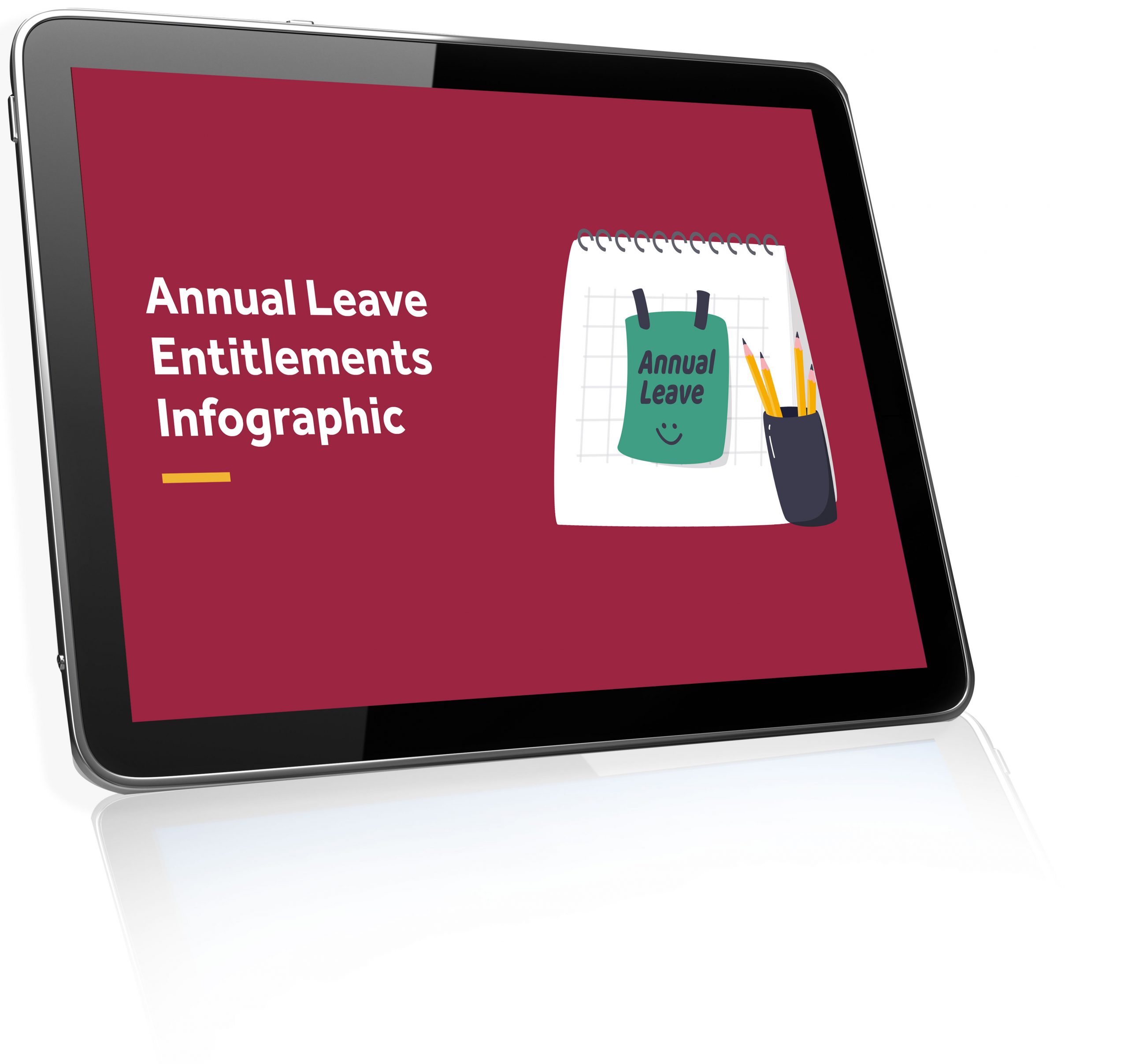
Employee leave refers to the period of time an employee is absent from work. Employees can take leave for a variety of reasons, Employsure reviews the 11 things you need to know about leave entitlements, including the different types of leave.
Sick leave is now referred to as carer’s or personal leave. Sick leave entitlements afford employees 10 days per year of leave, though the leave accumulates as the employee continues to work. If an employee is terminated or stops working, and have sick leave entitlements unused, it is not necessary to pay them for their unused sick leave.
The implication of having so many different types of leave is that each has different entitlements owed to staff. Employers and employees alike need to be aware of these entitlements so that expectations are set when an employee is out of the office. Employers are the gatekeepers to approving and denying leave, it is imperative that employers make employees aware of the following entitlements.
Top 11 things employers need to know about leave entitlements
1. Accrual of annual leave
The majority of employees, except for casual employees, are entitled to four weeks of annual leave, based on their ordinary hours of work, and this leave accrues each pay period. An employee can take their annual leave at any time, it is however recommended you nominate a four week notice period (or what is deemed appropriate for your business) in your policies and procedures. The only time annual leave does not accumulate is when an employee is on unpaid annual leave, unpaid carer’s leave, unpaid sick leave or unpaid parental leave.
2. Personal and carer’s leave
Sick leave is now called personal/carer’s leave. A full-time employee is entitled to 10 days of personal leave per year, which accrues on a regular basis. Part-time employees are entitled to a pro-rata amount of personal leave. This means that employees do not get their personal leave entitlement on commencement, they accrue it on an ongoing basis throughout the year. The leave entitlement keeps accruing for as long as the employee works for the business. Any outstanding leave is not paid out upon termination or resignation. An employee must provide reasonable evidence to have access to this entitlement.
3. Adoption related leave
An employee is entitled to adoption leave if they have been with a company for 12 months or longer and if they are to be the primary career of the adopted child. If an employee decides to adopt a child, they can request 12 months of unpaid adoption leave so long as the child is under 16 years of age, is not the child of the employee or their partner and has not lived with the employee for 6 months or more. The employee can then request a further 12 months of unpaid adoption leave, which can be refused on reasonable business grounds.

Do you understand staff leave entitlements?
Understanding annual leave can be tricky! What are your staff’s leave entitlements? Do you pay your staff for a public holiday if they are on leave? What happens during a business shutdown? Get the facts so you can manage leave with confidence.
Download our FREE Annual Leave Entitlements Infographic today!
4. Community service leave
An employee is entitled to unpaid leave to undertake community service activities such as voluntary emergency management. The period of community service leave includes travel time to the activity, time spent at the activity, along with reasonable rest and reprieve afterwards. Community service leave does not accrue as it is based on external events. There is no limit to the amount of service leave an employee can take, as long as it is deemed as reasonable. All employees, including casuals, are entitled to unpaid community service leave.
5. Jury duty
Jury duty is a form of community service leave, and the only one which is paid. When employees take leave to complete jury duty, they receive jury service pay from the government, and are sometimes entitled to a ‘make up pay’. Make up pay is the difference between any jury duty payment the employee receives (excluding any expense-related allowances) from the court and the employee’s base pay rate for the ordinary hours they would have worked. Legislation varies from state to state so it is important to be aware of the entitlements in your state.
6. Long term illness
An employee cannot be fired for being sick, nor can they be treated unfavourably for having an illness. If an employee does not have sufficient sick leave accrued they can take unpaid personal leave if they are unfit to work due to illness or injury.
7. Parental leave
Parental leave can be taken when an employee or their spouse/de facto partner gives birth or adopts a child under 16. Employees are entitled to 12 months unpaid parental leave if they have been employed for a continuous 12 month period. An employee can request to take a further 12 months of unpaid leave, but this request can be refused on reasonable business grounds.
8. Long service leave
Long service leave is an additional employee vocational leave. An employee who has been with the same employer for a long period of time is entitled to payable long service leave. Please note, entitlements for this type of leave vary from state to state therefore, it is important to understand the expectations for your business location/s.
9. Pregnant employees
Pregnant employees are still entitled to their ordinary sick leave entitlements whilst pregnant. Pregnancy is not considered an illness or injury; however, if a woman becomes sick or injured, sick leave can be taken. A pregnant employee can take unpaid special maternity leave if she has a pregnancy related illness or if her pregnancy ends after 12 weeks due to miscarriage or stillbirth. The employer can request a medical certificate or evidence before the employee takes special maternity leave.
10. Refusing holidays
An employer can reasonably refuse to grant annual leave requests dependant on certain factors.
The needs of the business (is the employee requesting time off during your busiest time?)
The employee has not provided adequate notice
The employee does not have sufficient annual leave accrued
Customs and practices of the business
11. Continued absenteeism
Absenteeism is an employee’s continual or habitual absence from work. If an employee is routinely absent from work, it is best to act immediately before it results in lack of productivity for your business. Some of the most common reasons for absence are outlined below.
Bullying and harassment – employees who feel they are being bullied by colleagues or managers may miss work to avoid interactions with these people
Stress and low morale – employees who feel underappreciated or are suffering from workplace related stress may regularly miss work
Childcare/immediate family care – an employee may be forced to miss work to look after sick children or immediate family, if other arrangements have fallen through
Disengagement – employees who are not committed to their jobs are most likely to have continued absenteeism
When it comes to leave entitlements, Employsure can guide you through your obligations. Call our FREE Advice Line on 1300 651 415 to get all your questions answered.







